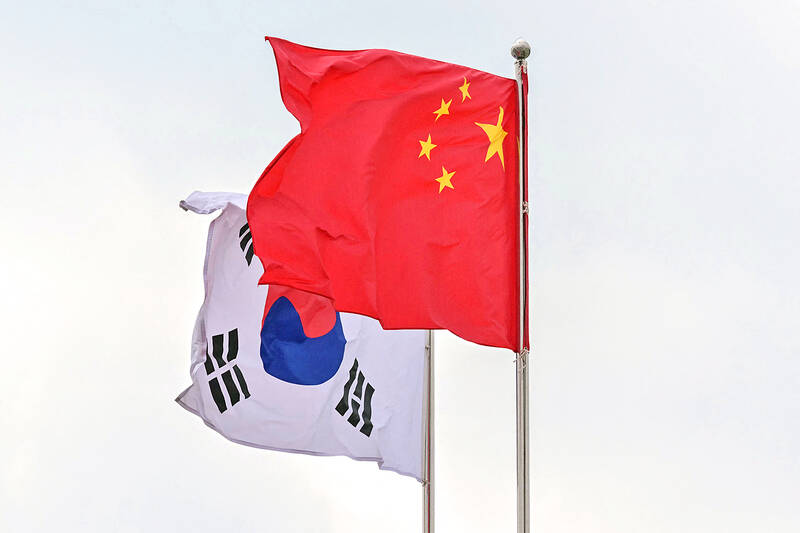China yesterday confirmed the detention of a South Korean citizen suspected of espionage, saying it had advised embassy officials, without identifying the individual or detailing the charges.
It is the first time a South Korean national is being held under an expanded counterespionage law that took effect in July last year.
The case could deter investment and operations by South Korean firms in the country’s largest trade partner, following the departure of Japanese expatriates after a compatriot working for Astellas Pharma Inc faced similar charges.

Photo: AFP
It centers on a former employee of Samsung Electronics Co who then worked at a Chinese chip firm, the Yonhap news agency reported.
“The South Korean citizen was arrested by the Chinese authorities in accordance with the law on suspicion of espionage,” Chinese Ministry of Foreign Affairs spokesman Lin Jian (林劍) told a regular news briefing in Beijing, without giving details.
The South Korean embassy in China had been notified, he added.
On Monday, Yonhap said the individual was suspected of leaking semiconductor-related information to South Korean authorities and was living in Hefei in China’s eastern province of Anhui when he was detained.
Major Chinese chip companies, such as ChangXin Memory Technologies Inc (長鑫存儲), are headquartered in the city.
Since Washington began banning export of cutting-edge foreign chips and chipmaking equipment to China in 2020, Beijing has invested billions of dollars in its domestic semiconductor industry to achieve a goal of self-sufficiency.
The tensions around the industry have made Beijing wary of information leaks, which it views as a national security threat.
The confirmation of the arrest also comes after tough measures by Seoul to prevent what it sees as the theft of semiconductor intellectual property by Chinese firms.
Choi Jin-seog, a former Samsung executive who ran a chipmaking venture in China, was detained by the Seoul Central District Court last month on fresh accusations regarding the theft of chip processing technology.
Choi had already been the subject of a high-profile industrial espionage trial since July last year that underscored South Korea’s efforts to fight industrial espionage and slow China’s progress in chipmaking. Choi has denied any wrongdoing.

Sweeping policy changes under US Secretary of Health and Human Services Robert F. Kennedy Jr are having a chilling effect on vaccine makers as anti-vaccine rhetoric has turned into concrete changes in inoculation schedules and recommendations, investors and executives said. The administration of US President Donald Trump has in the past year upended vaccine recommendations, with the country last month ending its longstanding guidance that all children receive inoculations against flu, hepatitis A and other diseases. The unprecedented changes have led to diminished vaccine usage, hurt the investment case for some biotechs, and created a drag that would likely dent revenues and

Global semiconductor stocks advanced yesterday, as comments by Nvidia Corp chief executive officer Jensen Huang (黃仁勳) at Davos, Switzerland, helped reinforce investor enthusiasm for artificial intelligence (AI). Samsung Electronics Co gained as much as 5 percent to an all-time high, helping drive South Korea’s benchmark KOSPI above 5,000 for the first time. That came after the Philadelphia Semiconductor Index rose more than 3 percent to a fresh record on Wednesday, with a boost from Nvidia. The gains came amid broad risk-on trade after US President Donald Trump withdrew his threat of tariffs on some European nations over backing for Greenland. Huang further

CULPRITS: Factors that affected the slip included falling global crude oil prices, wait-and-see consumer attitudes due to US tariffs and a different Lunar New Year holiday schedule Taiwan’s retail sales ended a nine-year growth streak last year, slipping 0.2 percent from a year earlier as uncertainty over US tariff policies affected demand for durable goods, data released on Friday by the Ministry of Economic Affairs showed. Last year’s retail sales totaled NT$4.84 trillion (US$153.27 billion), down about NT$9.5 billion, or 0.2 percent, from 2024. Despite the decline, the figure was still the second-highest annual sales total on record. Ministry statistics department deputy head Chen Yu-fang (陳玉芳) said sales of cars, motorcycles and related products, which accounted for 17.4 percent of total retail rales last year, fell NT$68.1 billion, or

Macronix International Co (旺宏), the world’s biggest NOR flash memory supplier, yesterday said it would spend NT$22 billion (US$699.1 million) on capacity expansion this year to increase its production of mid-to-low-density memory chips as the world’s major memorychip suppliers are phasing out the market. The company said its planned capital expenditures are about 11 times higher than the NT$1.8 billion it spent on new facilities and equipment last year. A majority of this year’s outlay would be allocated to step up capacity of multi-level cell (MLC) NAND flash memory chips, which are used in embedded multimedia cards (eMMC), a managed